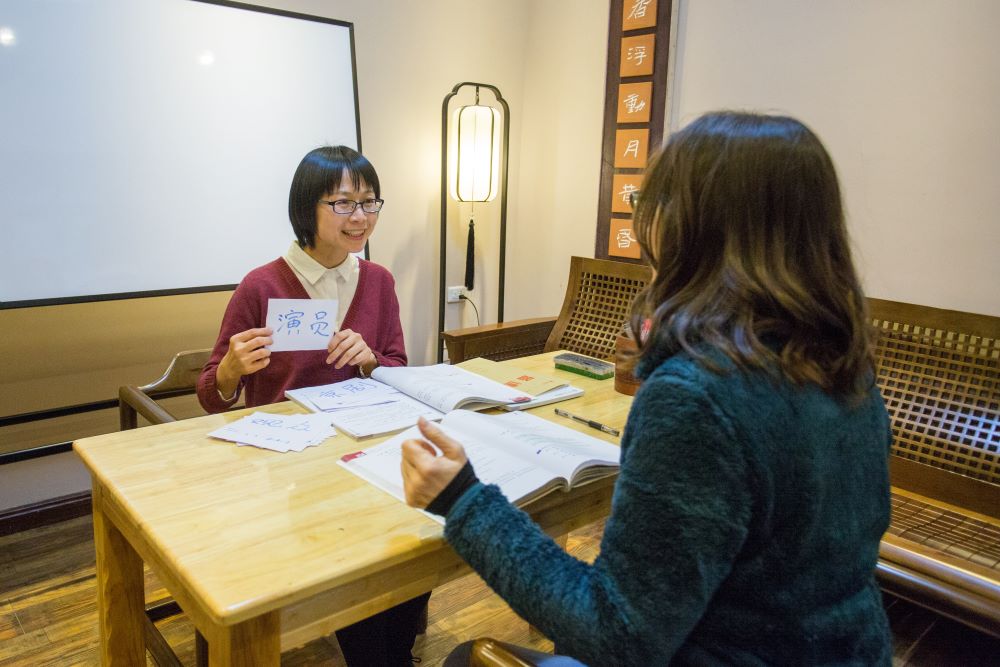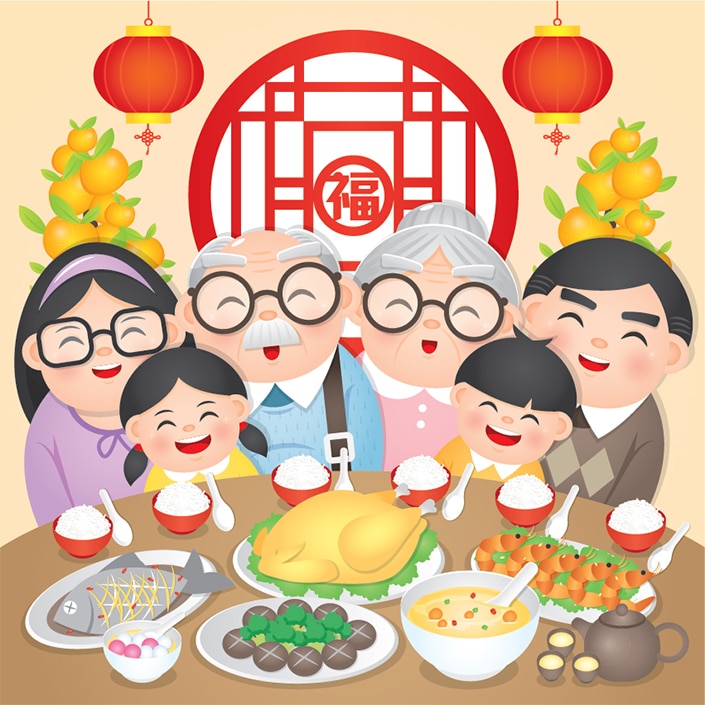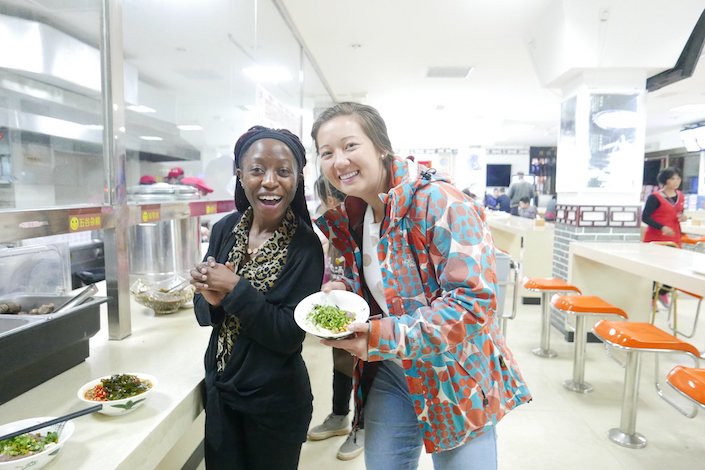The 100 Most Common Chinese Measure Words and Their Uses
Learn Chinese in China or on Zoom and gain fluency in Chinese!
Join CLI and learn Chinese with your personal team of Mandarin teachers online or in person at the CLI Center in Guilin, China.
As a student of Chinese, measure words (量词 or liàngcí in pinyin) are one of the first aspects of Chinese grammar you’ll encounter. The fact that almost all Chinese nouns must be preceded by a measure word makes these pesky classifiers hard to avoid.
Luckily, Chinese measure words are one of the easier aspects of the language. Read on to get an idea of what they are and how to use them.
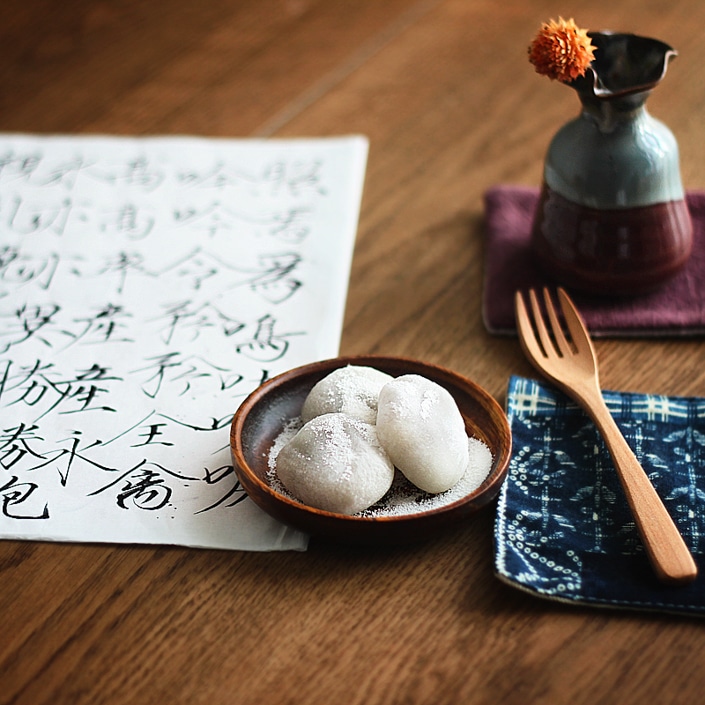
Table of Contents
The 100 Most Common Chinese Measure Words
There are many different measure words in Chinese. Some are used more frequently than others. Check out our list of 100 of the most common measure words that you're likely to encounter below.
Note that any value in the Example column below can be swapped for a larger number and the rest of the example phrase stays the exact same. For instance, 一个人、两个人、三个人 (yī gè rén, liǎng gè rén, sān gè rén, sì gè rén; one person, two people, three people), and so on. The sole exception in the below chart is 点 (diǎn; a little; a bit; some).
| Hànzì | Pīnyīn | Used for: | Example | Translation |
|---|---|---|---|---|
| 个 | gè | people or objects | 一个人 (yī gè rén) | a person |
| 块 | kuài | pieces of cloth, cake, soap, etc.; money and currency units (colloquial) | 一块蛋糕 (yī kuài dàngāo) | a piece of cake |
| 只 | zhī | birds and certain animals, one of a pair, some utensils, boats, etc. | 一只鸟 (yī zhī niǎo) | a bird |
| 本 | běn | books, parts of a serial, etc. | 一本书 (yī běn shū) | a book |
| 辆 | liàng | vehicles | 一辆车 (yī liàng chē) | a car |
| 瓶 | píng | quantity contained in a bottle, vase, jar or flask | 一瓶啤酒 (yī píng píjiǔ) | a bottle of beer |
| 杯 | bēi | certain containers of liquids: glass, cup | 一杯水 (yī bēi shuǐ) | a glass of water |
| 双 | shuāng | pairs (of shoes, socks, chopsticks, etc.) | 一双袜子 (yī shuāng wàzi) | a pair of socks |
| 件 | jiàn | clothes, events, things, etc. | 一件衣服 (yī jiàn yīfú) | a piece of clothing |
| 张 | zhāng | flat objects and sheets (bed, desk, paper, etc.); certain body parts (face, mouth) | 一张纸 (yī zhāng zhǐ) | a piece of paper |
| 碗 | wǎn | measurement of food and drink (bowl) | 一碗饭 (yī wǎn fàn) | a bowl of rice |
| 种 | zhǒng | types, kinds, sorts | 一种动物 (yī zhǒng dòngwù) | a type of animal |
| 匹 | pǐ | horses, mules; bolts of cloth | 一匹马 (yī pǐ mǎ) | a horse |
| 头 | tóu | certain domestic animals (cattles, mules, pigs, etc.); garlic | 一头猪 (yī tóu zhū) | a pig |
| 条 | tiáo | long, narrow or thin objects (ribbon, river, road, trousers, etc.) | 一条鱼 (yī tiáo yú) | a fish |
| 位 | wèi | people (courteous) | 一位女士 (yī wèi nǚshì) | a lady |
| 项 | xiàng | itemized things (clauses, tasks, research projects, etc.) | 一项项目 (yī xiàng xiàngmù) | a project |
| 名 | míng | people | 一名学生 (yī míng xuéshēng) | a student |
| 些 | xiē | a small amount or small number (greater than one) | 一些东西 (yī xiē dōngxī) | some things |
| 家 | jiā | families or business establishments | 一家公司 (yī jiā gōngsī) | a company |
| 点(儿) | diǎn('er) | a little; a bit; some | 一点(儿)纸 (yī diǎn(er)zhǐ) | some paper |
| 场 | cháng | recreational, sports or other activities | 一场球赛 (yī chǎng qiúsài) | a ball game; a match |
| 句 | jù | sentences | 一句话 (yī jù huà) | a sentence |
| 段 | duàn | stories, periods of time, lengths of thread, etc. (a section, segment or part) | 一段时间 (yī duàn shíjiān) | a period of time |
| 分 | fèn | spoken form of fractions and percentages; minutes; various units of measure | 三分之一 (sān fēn zhī yī) | one-third |
| 处 | chù | places, occurrences or activities in different places; items of damage (spot, point) | 两处错误 (liǎng chù cuòwù) | two mistakes |
| 片 | piàn | slices, tablets, tracts of land, areas of water; CDs, movies, DVDs; scenes, feelings, atmospheres, etc. | 一片土地 (yī piàn tǔdì) | a stretch of land |
| 套 | tào | books, furniture, rooms, methods, remarks (a set, suit or suite) | 一套书 (yī tào shū) | a set of books |
| 座 | zuò | mountains, buildings and other immovable objects | 一座山 (yī zuò shān) | a mountain |
| 部 | bù | works of literature, films, machines, etc. | 一部电影 (yī bù diànyǐng) | a film |
| 则 | zé | written items | 一则广告 (yī zé guǎnggào) | an advertisement |
| 层 | céng | layers, stratums (a storey, a floor) | 一层灰尘 (yī céng huīchén) | a layer of dust |
| 样 | yàng | kind, type | 两样点心 (liǎng yàng diǎnxīn) | two types of pastries |
| 群 | qún | people or animals (a group, herd, flock or pack) | 一群人 (yī qún rén) | a crowd of people |
| 届 | jiè | events, meetings, elections, sporting fixtures, years (of graduation) | 一届论坛 (yī jiè lùntán) | a forum (for discussion) |
| 支 | zhī | long, thin, inflexible objects (pens, guns); rods; army divisions; songs or compositions | 一支笔 (yī zhī bǐ) | a pen |
| 批 | pī | batches, lots, groups | 一批学生 (yī pī xuéshēng) | a group of students |
| 篇 | piān | paper, book leaves, written items, articles, etc. (sheet, leaf, piece) | 一篇文章 (yī piān wénzhāng) | an article |
| 番 | fān | actions, deeds; occurances (of an event, action or speech utterance); situations (kind, sort) | 一番功夫 (yī fān gōngfū) | a lot of effort |
| 股 | gǔ | smells, smoke, etc. (puff, whiff); sudden, forceful actions; long winding things (ropes, rivers); bands of people | 一股香味 (yī gǔ xiāngwèi) | a whiff of fragrance |
| 首 | shǒu | songs and poems | 一首歌 (yī shǒu gē) | a song |
| 声 | shēng | sounds | 一声炮响 (yī shēng pào xiǎng) | the sound of a canon |
| 颗 | kē | roundish objects (small spheres, pearls, corn grains, teeth, hearts, satellites, etc.) | 一颗星星 (yī kē xīngxīng) | a star |
| 组 | zǔ | sets, series, groups of people, batteries | 一组学生 (yī zǔ xuéshēng) | a group of students |
| 盏 | zhǎn | lamps | 一盏灯 (yī zhǎn dēng) | a lamp |
| 口 | kǒu | things with mouths (people, domestic animals, cannons, wells, etc.) | 一家三口人 (yī jiā sān kǒu rén) | a family of three |
| 把 | bǎ | objects with handles; small objects (a handful); certain abstract concepts | 一把刀 (yī bǎ dāo) | a knife |
| 间 | jiān | rooms; sections of rooms | 一间卧室 (yī jiàn wòshì) | a bedroom |
| 笔 | bǐ | sums of money, financial accounts, debts, deals, etc. | 一笔钱 (yī bǐ qián) | a sum of money |
| 所 | suǒ | houses, small buildings, institutions, etc. (schools, hospitals, etc.) | 一所学校 (yī suǒ xuéxiào) | a school |
| 对 | duì | pair, couple | 一对夫妇 (yī duì fūfù) | a married couple |
| 根 | gēn | long, thin objects (cigarettes, guitar strings, etc.) | 一根头发 (yī gēn tóufǎ) | a strand of hair |
| 幅 | fú | textiles or pictures | 一幅画 (yī fú huà) | a painting |
| 出 | chū | dramas, plays, operas, etc. | 一出戏 (yī chū xì) | a play; an opera |
| 道 | dào | long, narrow objects; doors, walls; orders, questions; courses in a meal, stages in a procedure, etc. | 一道题 (yī dào tí) | a question (on a test) |
| 拨 | bō | people (group; batch) | 一拨人 (yī bō rén) | a group of people |
| 队 | duì | files, lines or rows | 一队战士 (yī duì zhànshì) | a file of soldiers |
| 堆 | duī | heaps or piles; crowds | 一堆垃圾 (yī duī lājī) | a pile of rubbish |
| 阵 | zhèn | events or states of short duration | 一阵掌声 (yī zhèn zhǎngshēng) | a burst of applause |
| 面 | miàn | flat things or surfaces (drums, mirrors, flags); the number of times people meet each other | 一面镜子 (yī miàn jìngzi) | a mirror |
| 台 | tái | machinery, apparatus, instruments, etc.; a complete stage performance | 一台电脑 (yī tái diànnǎo) | a computer |
| 局 | jú | games (match, set, round, etc.) | 一局棋 (yī jú qí) | a game of chess |
| 棵 | kē | plants | 一棵树 (yī kē shù) | a tree |
| 盒 | hé | small box, case | 一盒糖果 (yī hé tángguǒ) | a box of candy |
| 户 | hù | households or families | 一户人家 (yī hù rénjiā) | a household |
| 栋 | dòng | houses or buildings | 一栋楼 (yī dòng lóu) | a building |
| 节 | jié | segments (lessons, train wagons, biblical verses, etc.) | 一节课 (yī jié kè) | a class (period) |
| 封 | fēng | sealed objects (letters or other things in envelopes) | 一封信 (yī fēng xìn) | a letter |
| 班 | bān | a group of people; a trip by bus, boat, etc. | 下一班火车 (xià yī bān huǒchē) | the next train |
| 盘 | pán | food (dish, helping); coils of wire; games of chess | 一盘菜 (yī pán cài) | a plate of food |
| 副 | fù | pairs, sets of things and facial expressions | 一副笑脸 (yī fù xiàoliǎn) | a smiling face |
| 趟 | tàng | times, round trips or rows | 这趟火车 (zhè tàng huǒchē) | this train |
| 款 | kuǎn | versions or models (of a product) | 一款新鞋子 (yī kuǎn xīn xiézi) | a new style of shoe |
| 团 | tuán | lumps or soft masses (wad of paper, ball of wool, cloud or smoke) | 一团面 (yī tuán miàn) | a lump of dough |
| 束 | shù | bunches, bundles, beams of light, etc. | 一束花 (yī shù huā) | a bunch of flowers |
| 门 | mén | subjects of study or fields of technical training | 一门外语 (yī mén wàiyǔ) | a foreign language |
| 架 | jià | machines, airplanes and instrument which rest on a tripod or stand | 一架飞机 (yī jià fēijī) | an airplane |
| 顿 | dùn | meals, beatings, scoldings, etc. (time, bout, spell, meal) | 一顿饭 (yī dùn fàn) | a meal |
| 堵 | dǔ | walls | 一堵墙 (yī dǔ qiáng) | a wall |
| 壶 | hú | bottled liquid (kettle, pot, bottle, flask) | 一壶茶 (yī hú chá) | a pot of tea |
| 朵 | duǒ | flowers and clouds | 一朵花 (yī duǒ huā) | a flower |
| 排 | pái | lines, rows | 一排椅子 (yī pái yǐzi) | a row of chairs |
| 份 | fèn | shares, parts or portions (of a whole); copies (of documents, newspapers, periodicals, etc.) | 一份报纸 (yī fèn bàozhǐ) | a newspaper |
| 具 | jù | devices, coffins or dead bodies | 一具尸体 (yī jù shītǐ) | a corpse |
| 包 | bāo | packages, bundles or sacks | 一包大米 (yī bāo dàmǐ) | a sack of rice |
| 罐 | guàn | jars, pots or tins | 一罐葡萄酱 (yī guàn pútáo jiàng) | a jar of grape jam |
| 粒 | lì | grainlike things; small round things (peas, bullets, peanuts, pills, grains, etc.) | 一粒米 (yī lì mǐ) | a grain of rice |
| 卷 | juàn | small rolled things (wad of paper money, movie reel, spool, etc.) | 一卷卫生纸 (yī juàn wèishēngzhǐ) | a roll of toilet paper |
| 堂 | táng | classes, lectures, etc.; sets of furniture | 一堂课 (yī táng kè) | a class |
| 起 | qǐ | occurrences or unpredictable events (case, instance); groups (batch, group) | 一起交通事故 (yī qǐ jiāotōng shìgù) | a car accident |
| 枝 | zhī | flowers with stems intact; sticks, rods, pencils, etc. | 一枝梅花 (yī zhī méihuā) | a spray of plum blossoms |
| 株 | zhū | plants and small trees; seedlings | 一株树苗 (yī zhū shùmiáo) | a sapling |
| 轮 | lún | big round objects (disk, sun, moon); recurring events (round, turn) | 一轮会谈 (yī lún huìtán) | a round of talks |
| 桌 | zhuō | tables of guests at a banquet; table; tableful | 两桌客人 (liǎng zhuō kèrén) | two tables of guests |
| 桶 | tǒng | buckets, pails, cans, barrels, tubs, kegs | 一桶油 (yī tǒng yóu) | a barrel of oil |
| 滴 | dī | drops | 一滴水 (yī dī shuǐ) | a drop of water |
| 串 | chuàn | a string of things (string, bunch, cluster) | 一串珠子 (yī chuàn zhūzi) | a string of beads |
| 列 | liè | a series or row of things | 一列火车 (yī liè huǒchē) | a train |
| 箱 | xiāng | large boxes, cases, trunks | 一箱纸 (yī xiāng zhǐ) | a box of paper |
| 扇 | shàn | doors and windows | 一扇门 (yī shàn mén) | a door |
What are measure words?
Measure words are words used to quantify nouns. That might sound complicated at first, but the function of these words quickly becomes clear when we examine how they’re used in English.
Measure words in English
Although most English speakers may not have heard the term “measure words,” these words are actually relatively common in English. In fact, most people understand how to use them intuitively.
Words like “pair” and “piece” are English measure words. Whenever you say common phrases like “a pair of pants” or “three pieces of bread,” you’re employing English measure words like a pro!
Nouns like “pants” and “bread” sound odd without measure words. We wouldn’t normally say “three breads” or “a pants.” However, there are many other English nouns, like “house” or “cat,” that don’t take any measure words. Phrases like “a house” or “three cats” sound perfectly natural.
Measure words in Chinese
Measure words in Chinese are similar to those used in English, except easier! While English speakers have to decide whether or not it’s necessary to use a measure word with each noun they encounter, there’s usually no such question in Chinese.
Chinese proper nouns (think names of people or names of countries) don’t need measure words, but every other Chinese noun needs to be accompanied by one.
In Chinese, simple phrases like “a car,” “two cats” or “three buildings” must be paired with a measure word.
How are Chinese measure words used?
Employ the following structure to use Chinese measure words correctly:
- Number + Measure Word + Noun
The basics of Chinese measure words
Imagine that you want to say “a person” in Chinese. To do so, you'll need to utilize the correct vocabulary words and follow the above structure to create your phrase.
“Person” in Chinese is 人 (rén in pinyin). The measure word that goes with person is 个 (gè), and since you’re talking about a single person, you’ll need the Chinese word for one, which is 一 (yī). Thus, your phrase would read: 一个人 (yī gè rén; one person).
Now let’s say you want to make your phrase plural. In English, you’d either add an ‘s’ to the noun or use its irregular plural form, which in the case of “person” is “people.” Your correct plural English phrase would read, “two people.”
Luckily, Chinese nouns don’t have a special plural form. They stay the same no matter whether they’re plural or singular.
To create the Chinese equivalent of the English phrase “two people,” you simply need to replace the Chinese number one (一 yī) with the Chinese number two (两 liǎng) to form the phrase 两个人 (liǎng gè rén; two people).

To talk about the two people in this image, you’ll need to add the measure word 个.
Different types of nouns, different types of Chinese measure words
What happens if you want to translate a more complex English phrase that contains an English measure word, like “a piece of cake”?
In this sentence, the English measure word is “piece.” To translate it into Chinese, we must first identify the noun, which is “cake,” or 蛋糕 (dàngāo) in Chinese.
Next, we need to know the specific Chinese measure word that goes with 蛋糕 (dàngāo), which is 块 (kuài). If we want to talk about one piece, we’d also need the Chinese word for “one,” which is 一 yī. After plugging these words into the number + measure word + noun construction above, our Chinese phrase would read 一块蛋糕 (yī kuài dàngāo; one piece of cake).
If we had two pieces of cake, then we’d write 两块蛋糕 (liǎng kuài dàngāo; two pieces of cake).
Note that in English, measure words are generally used with articles like “a” and the preposition “of.” These are unnecessary in Chinese, however.
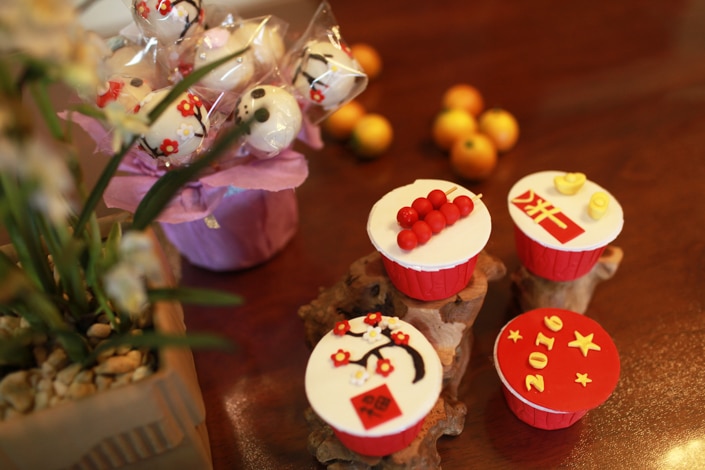
The measure word used to talk about pieces of cake in Chinese is 块.
Why measure words matter
There are several reasons why learning measure words is well worth your time.
Bad habits die hard: Meet 个 (gè)
个 (gè) is the most common Chinese measure word and the easiest to use. It’s a generic, catch-all measure word.
It’s possible to use 个 (gè) with almost any Chinese noun and still be understood. Sometimes, native speakers even default to 个 (gè) after forgetting which measure word to use with a certain noun. Of course, that doesn’t mean it’s always correct to use 个 (gè).
After realizing how common 个 (gè) is, many students quickly begin overusing it. This overuse of 个 (gè) as a beginner can lead to bad habits that will be hard to change later on. If you don’t pay attention to learning and using the correct measure words now, it may be difficult to remember to do so in the future.
Measure words are an integral part of Chinese
Measure words are an important part of the Chinese language. If you don’t learn to use them correctly, you won’t ever be able to claim real fluency.
Just because Chinese speakers can understand what you mean to say when you use 个 (gè) instead of the correct measure word doesn’t mean that your speech sounds grammatically correct. If you want to be taken seriously by Chinese speakers, you’ll need to get the details right.
Measure words help with understanding
Using measure words correctly can also help people understand you better. This is because Chinese is full of homophones, which are words that have the same pronunciation but different meanings.
Since different nouns take different measure words, using the right measure word-noun pairing can help clarify your meaning.
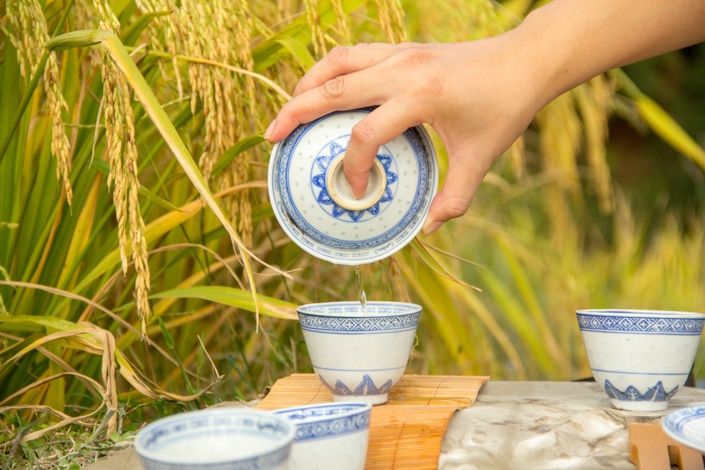
Using measure words correctly can help make your Chinese easier to understand.
10 common measure words to learn today
In addition to the very commonly used 个 (gè) and 块 (kuài) discussed above, here are 10 common Chinese measure words that every Chinese language learner should know.
1. 只 (zhī)
只 (zhī) is a common measure word used for birds and certain animals. It can also be used for one of a pair, usually when referring to certain parts of the human body that come in pairs, like eyes and hands. Less commonly, it’s used with objects like boats and suitcases.
Example 1:
- 三只鸟
- sān zhī niǎo
- three birds
Example 2:
- 一只手
- yī zhī shǒu
- a hand
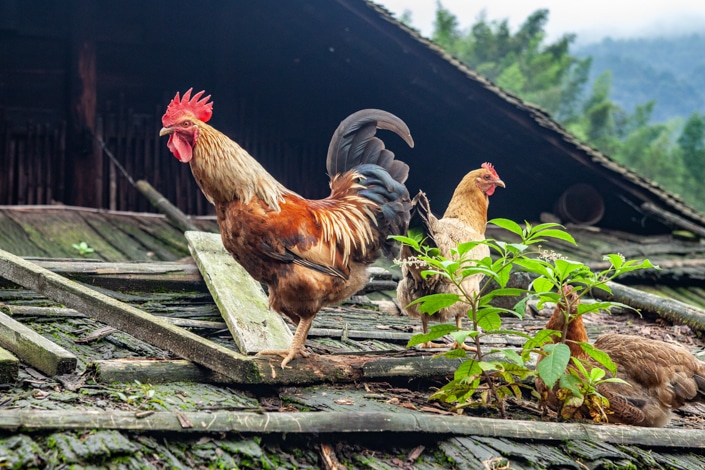
The measure word 只 is used for birds, including chickens.
2. 本 (běn)
本 (běn) is used with books, textbooks and other similar book-like bound objects, such as photo albums.
Example 1:
- 一本书
- yī běn shū
- a book
Example 2:
- 两本词典
- liǎng běn cídiǎn
- a dictionary
3. 辆 (liàng)
辆 (liàng) is another common measure word you’ll need to use when talking about vehicles like cars and buses.
Example 1:
- 五辆车
- wǔ liàng chē
- five cars
Example 2:
- 一辆公交车
- yī liàng gōngjiāo chē
- a bus
4. 瓶 (píng)
瓶 (píng) is similar to the English measure word “bottle,” but can also be used to refer to jars, flasks and vases.
Example 1:
- 一瓶水
- yī píng shuǐ
- a bottle of water
Example 2:
- 两瓶葡萄酱
- liǎng píng pútáo jiàng
- two jars of grape jelly

The measure word 瓶 is used for drinks that come in bottles, like soda or juice.
5. 杯 (bēi)
Like 瓶 (píng), 杯 (bēi) is another Chinese measure word with a close English equivalent. It’s used as a classifier for containers of liquids, much like “glass” and “cup” in English.
Example 1:
- 一杯水
- yī bēi shuǐ
- a cup of water
Example 2:
- 三杯啤酒
- sān bēi píjiǔ
- three cups of beer
6. 碗 (wǎn)
碗 (wǎn) is used like the English measure word “bowl.” It comes in handy when ordering food that comes in bowls, such as rice or noodles.
Example 1:
- 一碗米饭
- yī wǎn mǐfàn
- a bowl of rice
Example 2:
- 两碗面条
- liǎng wǎn miàntiáo
- two bowls of noodles
7. 双 (shuāng)
双 (shuāng) is roughly equivalent to the English measure word “pair.” It’s used with words for things that come in pairs like shoes, socks and chopsticks.
Example 1:
- 一双筷子
- yī shuāng kuàizi
- a pair of chopsticks
Example 2:
- 一双鞋子
- yī shuāng xiézi
- a pair of shoes
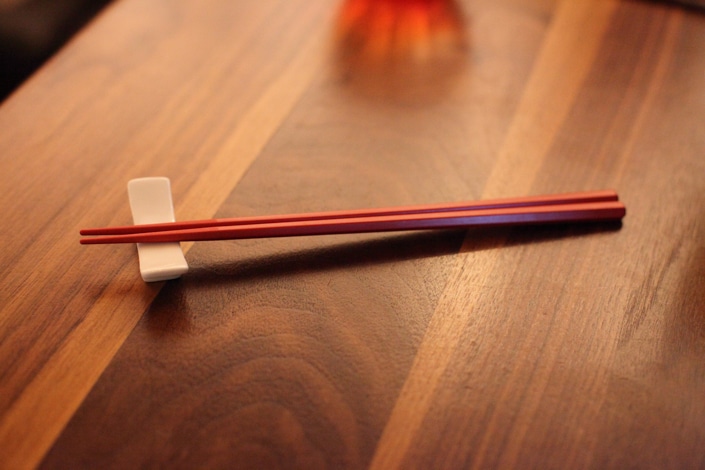
The Chinese measure word 双 is used for things that come in pairs, like chopsticks.
8. 件 (jiàn)
件 (jiàn) is a super useful measure word that’s most commonly used with clothing. It also works with certain items of furniture and luggage, as well as with abstract events.
Example 1:
- 一件衣服
- yī jiàn yīfú
- a piece of clothing
Example 2:
- 一件事
- yī jiàn shì
- a matter (as in, a business matter, i.e. something that happened)
9. 张 (zhāng)
张 (zhāng) is a measure word that’s most commonly used with flat objects like paper, cards, tickets, desks and tables.
Example 1:
- 一张桌子
- yī zhāng zhuōzi
- a table
Example 2:
- 两张票
- liǎng zhāng piào
- two tickets
10. 种 (zhǒng)
种 (zhǒng) is used when talking about a sort, kind or type of thing. It can be used with nouns that refer to either objects or abstract concepts or feelings.
Example 1:
- 一种动物
- yī zhǒng dòngwù
- a type of animal
Example 2:
- 一种感觉
- yī zhǒng gǎnjué
- a kind of feeling (or, a type of feeling, a sort of feeling, etc.)
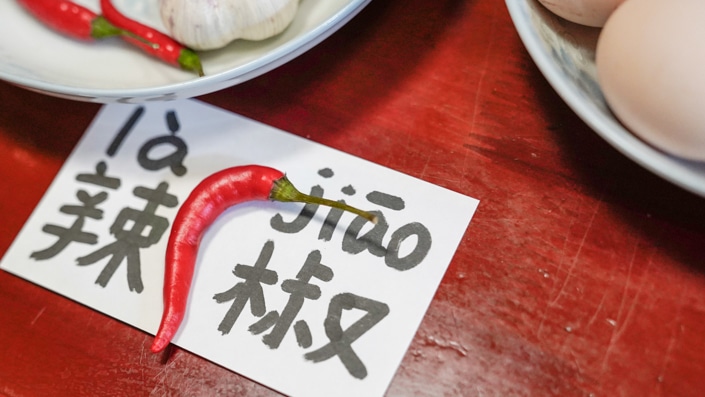
Learning measure words will allow you to talk about almost any Chinese noun with ease.
Chinese measure word learning strategies
So what’s the best way to learn Chinese measure words? We’ve outlined two useful paths to measure word mastery below.
Memorization
Unfortunately, learning Chinese measure words requires a certain amount of rote memorization. Eventually, you’ll need to memorize which measure words go with which nouns.
Luckily, the use of measure words in Chinese isn’t random. There are definitely some patterns which can help Chinese learners memorize them more efficiently.
When learning Chinese measure words, it helps to remember that they contain clues about the nouns they classify. Measure words can indicate whether the noun is an animal, an object, a person or a concept. They can also tell you something about the noun’s size and shape. Therefore, it’s helpful to memorize the types of things measure words usually describe.
For example, 张 (zhāng) is usually used to describe flat objects. If you memorize this fact, next time you’re talking about something flat, you can try using 张 (zhāng) as your measure word. Chances are, you’ll have used it correctly.
Some students find it helpful to learn groups of measure words based on the qualities of the objects they usually classify. For example, a student might make a list of the most common measure words used to describe animals, including 只 (zhī), 匹 (pǐ), 头 (tóu), 条 (tiáo) and 峰 (fēng). Then, they might memorize them all together. This makes it easier to make educated guesses about which measure words to use for animals.
This method certainly narrows the field of choices, but you’ll still need to know which measure word to use with which animal. Unfortunately, knowing to use 匹 (pǐ) with horses, 只 (zhī) with chickens and 峰 (fēng) with camels still requires memorization.
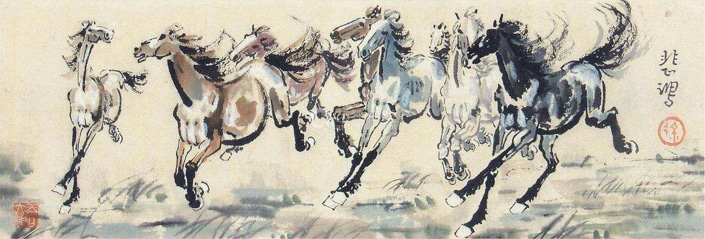
Knowing that 匹 is the Chinese measure word used for horses usually requires rote memorization.
Chinese Immersion
Even if you’ve spent a long time memorizing measure words, they won’t come naturally unless you immerse yourself in a Chinese-speaking environment. Chinese immersion can help you develop an almost subconscious understanding of which measure words go with which nouns.
One tricky aspect of Chinese measure words is that individual nouns can sometimes be used with more than one measure word depending on which aspect of the noun the speaker wants to highlight. This sort of nuanced usage is easiest to grasp through repeat exposure to the language being used in context.
Full language immersion in China is definitely the most effective way to improve your understanding of measure words as well as your overall Chinese fluency.
If studying Chinese in China isn’t possible, however, you should still make every effort to listen to Chinese frequently. Even passive listening can be amazingly effective. Try checking out our list of excellent Chinese podcasts for some ideas on what to listen to. You should also seek out native Chinese speakers to practice with, whether in your community or online.
With a bit of determination, you’ll soon be using measure words like an old China hand.




